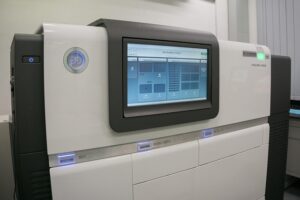Securing Patient Data: The Essence of Medical Record Translation Compliance in the UK Healthcare System
The UK's healthcare system, serving a culturally diverse population, relies on Medical Record Translation UK services to ensure clear communication and patient safety. These translations are indispensable for accurately conveying medical inform…….

The UK's healthcare system, serving a culturally diverse population, relies on Medical Record Translation UK services to ensure clear communication and patient safety. These translations are indispensable for accurately conveying medical information across different healthcare providers, reducing the risk of misdiagnosis or inappropriate treatment due to language barriers. Professional translators with expertise in medical terminology and cultural nuances handle sensitive data under strict compliance with GDPR, NHS guidelines, and UK data protection laws, including ISO 17100 standards for quality. The robust legal framework governing medical record translation in the UK mandates secure end-to-end encryption, specialized staff training, and adherence to international and national information governance protocols. This ensures the integrity and confidentiality of patient data, which is essential for maintaining trust between patients and healthcare providers. Medical Record Translation UK services are pivotal in facilitating culturally competent care within the NHS, leading to improved health outcomes and more equitable patient management across the multicultural landscape of the UK's healthcare system.
In an increasingly interconnected world, the imperative for clear and secure communication across healthcare systems is paramount. Within the UK’s National Health Service (NHS), the need to transcend language barriers through reliable medical record translation is not just a matter of patient care but a legal and ethical necessity. This article delves into the critical role of secure medical record translations, outlining the legal framework and compliance requirements that underpin this practice in the UK. It also highlights best practices for maintaining data security and confidentiality during the translation process. By examining real-world case studies, we’ll see how precise translations not only enhance patient outcomes but also contribute to the efficacy of healthcare delivery across the UK.
- Understanding the Importance of Secure Medical Record Translation in the UK Healthcare System
- The Legal Framework and Compliance Requirements for Medical Record Translations in the UK
- Best Practices for Ensuring Data Security and Confidentiality During Medical Record Translation
- Overcoming Language Barriers: The Role of Accurate Translation in Patient Care and Outcomes
- Case Studies: How Secure Medical Record Translation Improves Healthcare Delivery in the UK
Understanding the Importance of Secure Medical Record Translation in the UK Healthcare System

In the UK’s diverse healthcare landscape, the necessity for accurate and secure medical record translation cannot be overstated. The UK is home to a multicultural populace, with patients whose primary language may not be English. This presents a significant challenge in maintaining the integrity of patient care, as miscommunication can lead to errors in diagnosis and treatment. Secure medical record translation plays a pivotal role in this context, ensuring that healthcare professionals have access to precise and up-to-date patient information regardless of language barriers. The use of professional translation services specialising in medical terminology is essential for the safe and effective delivery of care. These services not only facilitate understanding between patients and their caregivers but also help in maintaining compliance with data protection laws, such as the UK’s General Data Protection Regulation (GDPR), which governs the handling of personal data. In the realm of healthcare, where a misstep could have dire consequences, the reliability of secure medical record translation is paramount to delivering high-quality patient care and upholding the trust patients place in the NHS.
The Legal Framework and Compliance Requirements for Medical Record Translations in the UK

In the United Kingdom, the translation of medical records is a process that must adhere to stringent legal frameworks and compliance requirements to safeguard patient confidentiality and ensure the integrity of medical information. The General Data Protection Regulation (GDPR), which harmonizes data privacy laws across Europe, including the UK post-Brexit through the UK GDPR, sets out the lawful basis for processing personal data, including medical records. Healthcare professionals must be cognizant of the principles set forth by these regulations, which mandate that personal data is processed lawfully, fairly, and transparently, with appropriate safeguards in place to prevent unauthorized access. Additionally, the Human Tissue Act 2004 and the common law duty of confidence further regulate the handling and sharing of medical information, reinforcing the need for precision and accuracy when translating patient records. Medical Record Translation UK services must be equipped with specialized knowledge to navigate these legal intricacies, ensuring compliance with both national and international standards such as ISO 17100 for translation services, which is essential for maintaining trust and reliability in healthcare settings. The NHS (National Health Service) also provides guidelines that dictate the protocols for sharing patient information across different care providers, emphasizing the necessity for translations to be both accurate and culturally sensitive to effectively support multilingual patients within the UK’s diverse population.
Best Practices for Ensuring Data Security and Confidentiality During Medical Record Translation

In the realm of healthcare, the integrity and confidentiality of patient data are paramount. When medical records require translation—especially within the UK’s diverse linguistic landscape—adhering to robust best practices for data security is critical. Medical Record Translation UK services must employ end-to-end encryption to protect sensitive information from unauthorized access throughout the translation process. This encryption should be complemented by secure file transfer protocols that comply with stringent data protection regulations, such as the UK’s General Data Protection Regulation (GDPR) and the NHS Information Governance Toolkit standards.
Healthcare providers and translators must also ensure that all personnel involved in the translation process are trained in handling confidential information. This includes understanding the legal requirements for data protection and implementing access controls to limit who can view or handle the medical records. Furthermore, translators specializing in Medical Record Translation UK should be proficient not only in the source and target languages but also in medical terminology specific to the UK’s healthcare system. By combining advanced technology with rigorous training and compliance with legal standards, Medical Record Translation UK services can safeguard patient confidentiality and ensure secure data exchange across linguistic barriers.
Overcoming Language Barriers: The Role of Accurate Translation in Patient Care and Outcomes

In today’s multicultural society, healthcare professionals in the United Kingdom face the challenge of language barriers that can significantly impact patient care and outcomes. Medical record translation UK plays a pivotal role in overcoming these obstacles. Accurate translations of medical records ensure that patients whose primary language is not English receive care that is informed by their complete medical history, thereby reducing the risk of misdiagnosis or incorrect treatment due to misunderstandings arising from language differences. The precision of translation services specializing in medical terminology is crucial for maintaining the integrity of patient records when they are transferred between healthcare providers who may not share a common language. This level of linguistic expertise is not just a matter of semantics; it directly affects the quality of care and the health outcomes for patients with limited English proficiency. Employing professional medical record translation UK services not only adheres to ethical standards of care but also aligns with legal requirements, such as the Equality Act 2010, which mandates that service providers, including healthcare organizations, take reasonable steps to communicate effectively with patients who do not speak English fluently. By ensuring that all medical records are accurately translated and understood by the entire healthcare team, patient safety is enhanced, and the efficacy of treatment is optimized, ultimately leading to better health outcomes for a diverse population.
Case Studies: How Secure Medical Record Translation Improves Healthcare Delivery in the UK

In the United Kingdom, the integration of secure medical record translation services has significantly enhanced healthcare delivery. A case study involving a multicultural hospital in London illustrates this transformation. The facility, with its diverse patient demographic, faced challenges in effectively treating non-English speaking patients due to language barriers. The implementation of advanced translation systems for medical records allowed healthcare professionals to access patient histories and critical health information in real-time, thereby eliminating potential miscommunications and ensuring accurate diagnoses and treatments. This led to improved patient outcomes and a more efficient use of medical resources. Moreover, the enhanced security features embedded within these translation services ensured that sensitive patient data remained confidential, adhering to stringent data protection laws such as the UK’s General Data Protection Regulation (GDPR).
Another case study from a National Health Service (NHS) hospital in Manchester highlighted the benefits of secure medical record translation in post-discharge care. Patients who were discharged with follow-up care instructions translated into their native languages experienced fewer readmissions and better adherence to treatment plans. This not only improved patient satisfaction but also reduced the burden on emergency departments, as patients were able to understand and manage their conditions effectively at home. These real-world examples underscore the importance of secure medical record translation in facilitating culturally competent healthcare delivery across the UK. The adoption of these technologies is not just a step towards inclusivity but also a means to uphold the highest standards of patient care, ensuring that all individuals, regardless of their linguistic background, receive the same level of attention and support from the NHS.
In the UK’s multicultural healthcare landscape, secure medical record translation stands as a cornerstone for effective patient care and compliance with legal standards. This article has delineated the critical role of accurate translations in enhancing patient outcomes, ensuring data integrity, and adhering to the stringent regulations that govern healthcare information. By implementing robust security measures and adhering to best practices outlined within, healthcare professionals can navigate the complexities of medical record translation with confidence. The case studies provided underscore the tangible benefits of secure translations in optimising patient care delivery across the UK. It is clear that medical record translation is not just a service but an indispensable tool for fostering equitable and high-quality healthcare, and it remains essential for professionals to stay abreast of these developments to maintain the trust and safety of patients from diverse linguistic backgrounds.






